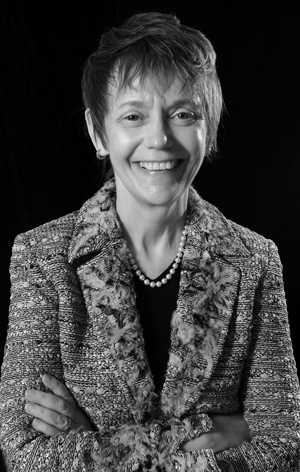Glimpses
The first woman president of both Colgate and Swarthmore Universities, Rebecca Chopp, PhD’83, waves a flag for the liberal arts.
By Ruth E. Kott, AM’07
Photography by Dan Dry

Rebecca Chopp, PhD’83, the first woman president of Swarthmore College, came to Chicago from heartland country, earning her bachelor’s from Kansas Wesleyan University and her MDiv from Kansas City’s St. Paul School of Theology. “Walking onto the campus of Chicago was walking into a threshold of intellectualism I didn’t know existed,” she says. Initially awed by “the love of questioning and debating and collaborating among the students and faculty,” Chopp found that academic life suited her. A scholar of Christian theology, theological education, and women’s studies, she was the first woman president of Colgate University, dean of the Yale University Divinity School, and provost of Emory University. Chopp—who received a Chicago Alumni Association Professional Achievement Award in 2008—arrived at Swarthmore, a small liberal-arts college that is heavily dependent on its endowment, in July 2009, just as the financial crisis hit the school hard.
Consensus building: Swarthmore is a Quaker school, founded by Quakers. ... That sense of justice and consensus—the Quaker practices of really listening and respecting one another—is the kind of process we used in the community to adjust the budget by $8 million. The community decided early on that it would not fire anyone and it would not cut financial aid, which was rare because many colleges were turning precisely to those two financial pools. ... It took us a full year to figure out how to do it, and every sector of the community made commitments and got involved, and everybody found ways to create efficiencies and to reduce and adjust budgets.
First woman president: I think many at Colgate expected there to be problems, but I really never experienced anything. I had one alum, a charming man, tell me that he thought it was fine to have a woman president, just so long as I never appointed a woman athletic director. It was kind of funny, and he laughed when he said it too. ... At Swarthmore, I just think people felt it was time. There’s a woman chair of the board, there’s a woman provost, there’s a woman CFO, there’s a woman dean of students. Swarthmore has an interesting history, in that it was founded by women and men. In Pennsylvania at that point [in 1864], women could not hold property, and yet in the beginning, women were half the members of the board.
A shifting view of liberal arts: Change is always happening, but at certain times there’s a tipping point where the new starts emerging. The financial crisis, for education, has been one driver. But I think knowledge itself has started to shift—in the sciences, in the social sciences, in humanities. It’s not that the older tradition [of preparing students for professional success and for leadership] is going away; it’s that it’s being expanded from within. Technology is certainly transforming education. We no longer have a homogenous student population, if we ever really did. We’re all so aware that we’re educating for a global arena. ... Religion, for example, used to be taught largely around Christian and Jewish models, and now almost every religion department in the country includes Hinduism and Buddhism and a variety of world religions. After spending time in Tokyo and having a wonderful experience at a Shinto temple, I’m wondering why we’re not teaching Shintoism over here.
Expanding one’s horizons: How knowledge is gathered, collected, interpreted has changed. Look at the blurring of the boundaries between the classroom and the community, the partnerships between a faculty member and a group of students here and a group of students in Singapore or Cape Town. There is a kind of enactment or embodiment of doing education—not only sitting and learning—though the sitting and learning is still important.
Those were the days: We lived on 55th Street, and my [first] husband was the pastor of United Church of Hyde Park. We had a little son, and we would go to the restaurants and sit next to [philosopher] Paul Ricoeur. Above all, it was an amazing education about how to think, knowledge about the world, an intense variety of perspectives. I had wonderful professors: David Tracy, Paul Ricoeur—people who took me seriously and stretched me to learn.
